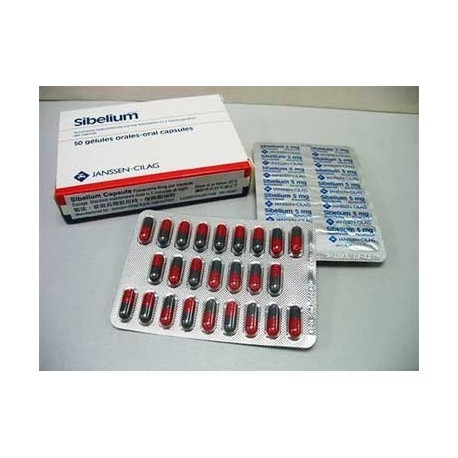 View larger
View larger Sibelium (Flunarizine) 5 Mg 50 Tablets
SBL3387
New product
BUY MORE PAY LESS
| Quantity | Discount | |
|---|---|---|
| 2 | 5% | |
| 3 | 10% | |
| 4 | 15% | |
| 5 | 20% |
Volume discounts
| Quantity | Discount | You Save |
|---|---|---|
| 2 | 5% | Up to $2.60 |
| 3 | 10% | Up to $7.80 |
| 4 | 15% | Up to $15.60 |
| 5 | 20% | Up to $26.00 |
More info
Each of the Sibelium capsules contains flunarizine hydrochloride equivalent to 5 mg flunarizine as an active ingredient.
SIBELIUM is a drug used to prevent migraine attacks and to reduce dizziness in some diseases with dizziness.
1.How to use SIBELIUM?
Instructions for proper use and dose/frequency of administration
Your doctor will determine the dose of your medicine depending on your disease and will apply it to you. Do not use SIBELIUM for more or longer than recommended.
Use in the elderly
When starting SIBELIUM treatment:
- If you are under 65 years old, take 2 capsules in the evening before going to bed.
- If you are over 65 years old, take 1 capsule in the evening before going to bed.
You may begin to see some of the beneficial effects of the drug during the first month of treatment. However, you will need to use the drug for at least 2 months for the full effect of the drug to be seen.
Continue SIBELIUM treatment:
After using the drug for 2 months, your doctor will tell you whether to continue the drug. When you decide to continue treatment, you should continue with the following doses.
Continue to use the same amount you took 5 days a week before (1 or 2 capsules a day before going to bed).
Then do not take the medicine for two consecutive days.
Complete your treatment by continuing to take it in this way (5 days with medication, 2 days without medication).
Normally, SIBELIUM treatment continues for 6 months. If symptoms come back after stopping your treatment, talk to your doctor about whether to start again.
Do not forget to take SIBELIUM on time.
Your doctor will advise you how long your treatment with SIBELIUM will last. Do not stop the treatment early because you will not get the desired result.
Application route and method
SIBELIUM is taken orally by swallowing with some water.
different age groups
- Use in the elderly: For those older than 65 years, 1 capsule per day is used.
Use in children
Any information on its use in children
not available.
If you have the impression that the effect of SIBELIUM is too strong or too weak, talk to your doctor or pharmacist.
If you use more SIBELIUM than you should
If you have used more SIBELIUM than you should, consult your doctor. In this case, drowsiness and fatigue can be seen. If you have taken too much, you may experience an agitation or rapid heartbeat. In this case, go to the emergency department of the hospital immediately.
If you have used more than you should use from SIBELIUM, talk to a doctor or pharmacist.
2. What are the possible side effects?
Like all medicines, there may be side effects in people who are sensitive to the substances contained in SIBELIUM.
If any of the following occur, stop using SIBELIUM and IMMEDIATELY inform your doctor or go to the nearest hospital emergency department:
- The incidence of hypersensitivity to SIBELIUM is rare. Hypersensitivity may be recognized by symptoms such as skin rash, itching, hives, shortness of breath or difficulty in breathing and/or facial swelling.
These are all very serious side effects.
If you have one of these, you have a serious allergy to SIBELIUM. You may need emergency medical attention or hospitalization.
All of these very serious side effects are very rare.
Tell your doctor if you notice any of the following:
- Congested or runny nose.
- Increased appetite, weight gain.
- symptoms of depression; difficulty falling asleep or waking up; extreme anxiety; decreased concern for the environment.
- Sleeping state; heavy blood or unusual drowsiness; loss of harmony with the environment; pins and needles or tingling sensations in the legs; state of restlessness; ringing in the ears; tremors in the arms, legs, and neck region, and impaired coordination of involuntary movements, which can also impair body posture.
- Feeling like your heart is beating harder than usual.
- nausea; dry mouth; constipation; stomach, belly or stomach pain.
- excessive sweating; redness or pinking of your skin.
- Muscle pains; muscle twitching.
- Breast pain, feeling of tightness in the breasts; discharge from the nipple; irregular periods, amenorrhea, or excessive menstruation; decrease in sexual desire.
- General weakness or loss of energy; swelling in the legs, feet, or elsewhere on the body.
These are mild side effects of SIBELIUM.

